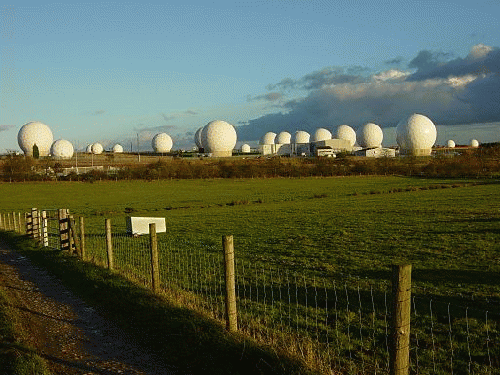
Radomes at Menwith Hill, Yorkshire. Photo taken November 2005
(Image by (From Wikimedia) Matt Crypto, Author: Matt Crypto) Details Source DMCA
The latest revelations of US spying on Europeans are far from novel, but I think nonetheless significant. They may well may prove to be the straw that broke the camel's back, in terms of trans-Atlantic trust. Well-informed Europeans (such as the German MEPs) recall very well that the issue came up in the 1990s, after certain triumphs of US communications intelligence came to light, notably the successful derailing of several trade deals for European companies like Airbus in favour of US contractors. A delegation of MEPs was sent to Washington - but they returned empty-handed. The matter was simply 'too secret' to even talk about, they were told.
I first wrote about the extensive network of US spy stations in 1999 in a book called 'No Holiday'. At the time, I lived near one, in fact, called Menwith Hill, in Yorkshire.
So I was very interested to see the editor of the London Guardian , Alan Rusbridger and his US deputy, Janine Gibson talking with PBS in America about the " Guardian 's revelations', as the paper put it on the website.
The thing that perplexed me though, is that neither of them seemed to know, or if they did were suppressing for some reason (and they admitted to clearing every line of their story with the US authorities before publication), two facts of vital public interest. The first is that this story of mass interception of civilian communications is a very old one, and the second is that the policy has nothing to do with protecting the public, but everything to do with economics red in tooth and claw.
But we can see the same story surfacing twenty five years before that: on 8 August 1975, NSA Director Lt General Lew Allen admitted to the Pike Committee of the US House of Representatives that :
"NSA systematically intercepts international communications, both voice and cable".
He also admitted that "messages to and from American citizens have been picked up in the course of gathering foreign intelligence". US legislators considered that such operations might have been unconstitutional. During 1976, a Department of Justice team investigated possible criminal offences by NSA. Part of their report was released in 1980. It described how intelligence on US citizens:
"was obtained incidentally in the course of NSA's interception of aural and non-aural (e.g., telex) international communications and the receipt of GCHQ-acquired telex and ILC (International Leased Carrier) cable traffic (SHAMROCK)".
The "Fink Report," the one and only Congressional investigation into FSF83 (the NSA communications station at Menwith HIll) in 1975, notes that the "NSA monitors the traffic of specific countries including Great Britain, our closest ally. There was a whole bank of machines [and] a whole team of men whose only job was to read and process intercepted British communications." Actually, the report was supposed to be secret too, but parts were released accidentally in 1978 as part of another inquiry.
As we have just seen, (with their formal letters to the US government requesting details on the extent of the interceptions) the German 's take the issue very seriously, and Directive 97/66/EC, adopted on 15 December 1997, concerning the processing of personal data and the protection of privacy in the telecommunications sector., states specifically (Article 5) that:
'Member States shall ensure via national regulations the confidentiality of communications. In particular, they shall prohibit listening, tapping, storage or other kinds of interception or surveillance of communications, without the consent of the users concerned, except when legally authorised.'
So 'unsecret' is it that there is the WASSENAAR Arrangement which establishes an international system for controlling the export of technologies that would make interception of communications difficult. It regulates the export of encryption products on the grounds that they constitute dual-use goods, i.e. goods which have both civil and military applications. Only technologies providing a very limited degree of security are authorised for uncontrolled export. Lawful cryptography offers no real protection against global interceptions of communications.
Unfortunately, if predictably, the media has so far in its coverage put the emphasis on the wrong issues - and allowed the debate to be on the ground chosen by the surveillance agencies - that is of "security' and "protection' of the public.
The real story is very different. The STOA report explains convincingly why the American interest is so great. The claim made by the authors (by Duncan Campbell and others) is that mass communications interception and processing is a system which enables the countries using it to obtain significant economic information and, hence, to secure a leading position on the commercial markets. The study quotes examples where American companies have secured contracts as a result of communications having been intercepted.
* In January 1994 an arms supply contract worth 30 million francs with Saudi Arabia ended up with McDonnell-Douglas, the rival of the Airbus consortium, because the former was privy to the financial terms offered by Airbus thanks to the electronic interception system.
(Note: You can view every article as one long page if you sign up as an Advocate Member, or higher).





